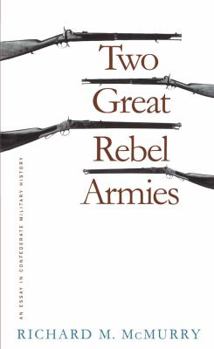Two Great Rebel Armies: An Essay in Confederate Military History
(Part of the Civil War America Series and Civil War America Series)
Select Format
Select Condition 
Book Overview
Richard McMurry compares the two largest Confederate armies, assessing why Lee's Army of Northern Virginia was more successful than the Army of Tennessee. His bold conclusion is that Lee's army was a better army--not just one with a better high command. "Sheds new light on how the South lost the Civil War.-- American Historical Review "McMurry's mastery of the literature is impressive, and his clear and succinct writing style is a pleasure to read. . . . Comparison of the two great rebel armies offers valuable insights into the difficulties of the South's military situation.-- Maryland Historian
Format:Hardcover
Language:English
ISBN:0807818194
ISBN13:9780807818190
Release Date:July 1989
Publisher:University of North Carolina Press
Length:222 Pages
Weight:1.07 lbs.
Dimensions:1.0" x 6.0" x 9.0"
Customer Reviews
5 ratings
Great Essay!
Published by Thriftbooks.com User , 15 years ago
I thoroughly enjoyed this essay comparing the Army of Northern Virginia with the Army of Tennessee. The author discusses the differences in origin, leadership, logistics, geography, officers and men. In a final chapter the author gives a good summary of the debate over Robert E. Lee and the socalled "western concentration bloc" that argues that Lee squandered men in fruitless battles in the East while letting the Confederate defense of the West wither. This is a great book to focus one's thoughts -- a well balanced beginning, not an end!
This is a MUST Civil War Read
Published by Thriftbooks.com User , 17 years ago
To be concise--this is one of the best books on the Civil War. It is accurate, informative and very easy to read.
Very Well Written and Insightful
Published by Thriftbooks.com User , 24 years ago
I'm not a student of the Civil War, so I cannot comment on the merit of McMurry's main points, but as a student of the Old South I thoroughly enjoyed this book. McMurry's analysis of the two armies is very well organized and easy to read. Simply, it's a page turner. This book is at once both highly focused on a single topic and illuminate of larger Civil War issues. I really enjoyed this book and will read it every so often in the years to come. I recommend McMurry's book without reserve.
One side or another?
Published by Thriftbooks.com User , 24 years ago
The title definately underscores how masterful Mr. McMurray has been in detailing the main differences between the Army of Northern Virginia and The Army of Tennessee. From the basics of command on through key strategy and deployment, both armies are beautifully dissected by McMurray's research, mirrored with an easy to understand style of writing.This book not only discusses how important the upper command structures were to both armies but how the various infrastructures such as railroads, food supply, communication and weapons production differed from east to west. This book can be summed up as an impressive literary study of the two great armies. It sheds light on the many differences as well as similarities and gives the reader new insight into the complex study of military history.I highly recommend this book to anyone interested in an intense study of both armies.Well done Mr. McMurray!
Success and Failure in the Confederate Cause
Published by Thriftbooks.com User , 25 years ago
Students of the American Civil War have long pondered the root causes of the illustrious successes of the Army of Northern Virginia in comparison to the miserable failures of the Army of Tennessee. For some, the answer is as simple as Robert E. Lee vs. Braxton Bragg (the comparison between the two is so compelling as to almost stifle further analysis). Fortunately, Dr. McMurry has delved into the subject with academic discipline and presented his results in this concise, convincing study - which, since its publication, has become a standard reference for later ACW histories from the academic community. Superior leadership - from the commanding general on down through the command structure, including experience, discipline and motivation of the regimental and company officers and their soldiers - was certainly a very large factor, but by no means the only important factor. The infrastructure of war (railroads, supply lines, communications) in the west was inferior for troop movements in a large area which was primarily still wilderness. Key areas in the west (Tennessee, Kentucky) were indefensible due to the existence of penetrating rivers - exploited by Federal naval gunboat superiority. Federal efforts in the west were much more organized, supplied and led (at least later in the war) than their Confederate counterparts. Dr. McMurry applies the academic method in presenting the appropriate statistics to support his conclusions. The final analysis by McMurry is persuasive: the South adopted a strategy of trading land for time in the west (where the war could not be won, but was eventually lost) for an opportunity to try and win the war in the east (where relative advantages and the best opportunities existed). This strategy seems to have been the South's best chance for victory in a war heavily weighted against them (in terms of military resources) from the outset. There is also a very interesting appendix which presents McMurry's views on the "Lee bashing" fad - initiated by Thomas Connelly, of late supported by Alan Nolan in his ridiculous "Lee Considered". Again, the disciplined academic view is the most persuasive in these arguments.





